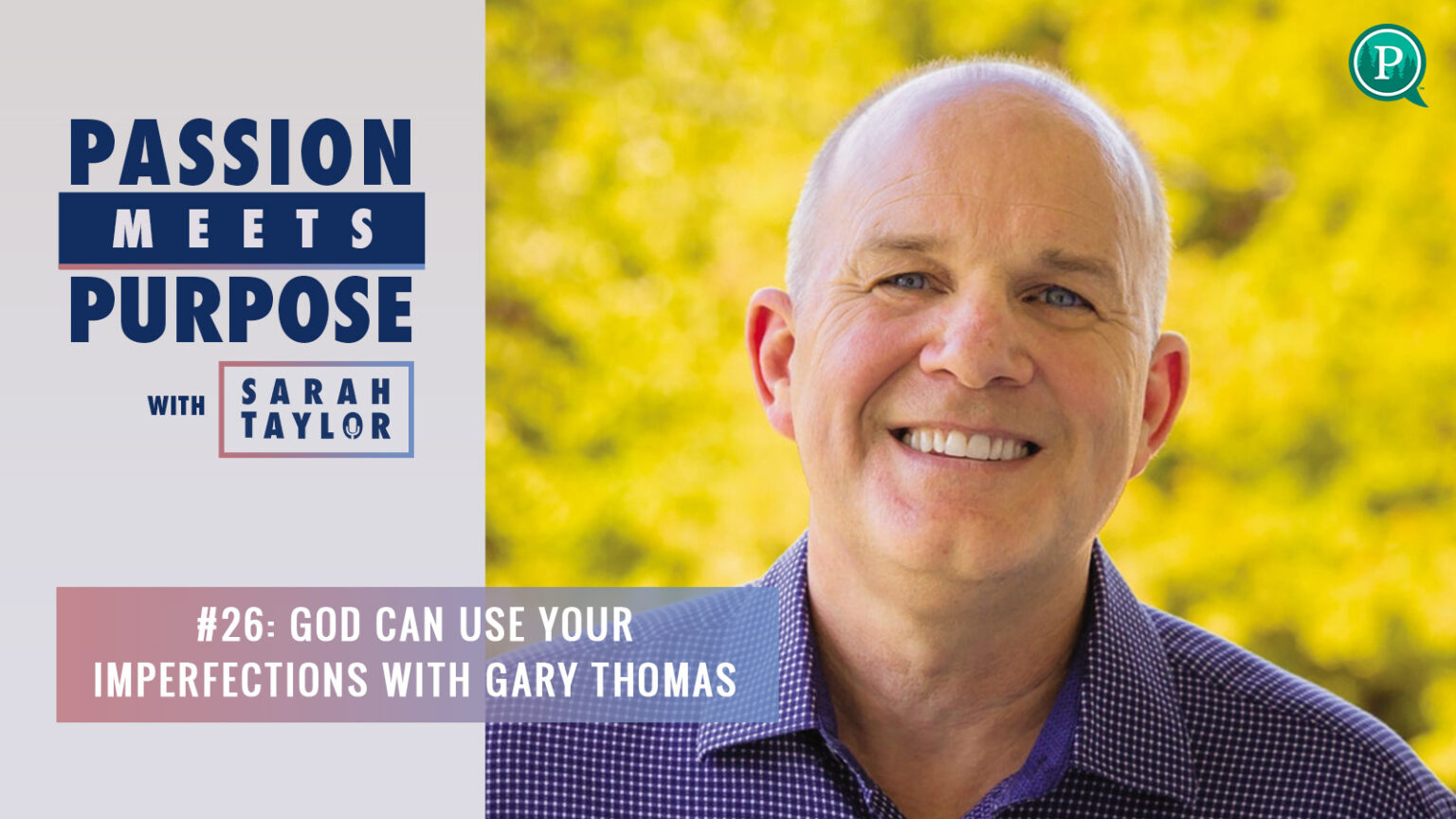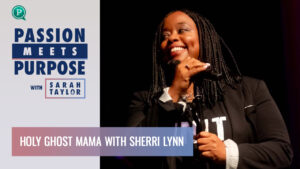How often have you wanted to hear you don’t need to be perfect or have it all together? Every day! On this episode of Passion Meets Purpose, Gary Thomas reminds us that God can use our imperfections and our limitations. In fact, the whole point is to show others that Jesus is the perfect one and not us.
An exciting conversation that will fuel your desire to embrace who you are and what you have to offer just as you are.
Interview Links:
Follow Gary Online | Facebook | Instagram | Twitter
Books: Sacred Pathways | Sacred Parenting | Sacred Marriage
Transcription:
Gary Thomas: Instead of trying to compete with the Messiah, accepting my role as a messenger. I didn’t have to be perfect. I didn’t have to have it all together. In fact, God could use my imperfections, and he could use my limitations. Dropping the title of Messiah and reminding ourselves that, no, we’re messengers… It’s a very freeing thing. It changes our ministry. We’re not trying to impress people with us. Trying to impress people with Jesus. We’re not acting like we have it all together. We’re trying to point into the Jesus who has it all together.
Sarah Taylor: His name is Gary Thomas, and I am so excited for you during this episode. You might even wanna take some notes. It’s rich, he’s smart. He’s fun. In fact, we open up this whole conversation with a little bit of a joke because Gary has a bunch of books. Sacred Pathways is how I was introduced to him, which we’re gonna get into a little bit, but it’s just all these different ways that each of us can connect with God.
And then there’s sacred marriage, sacred parenting. So, I said, what else is sacred, Gary? How long can you take this thing? And here’s his response:
Gary Thomas: Yeah. One of the things I’ve lived with since I kind of became known as the sacred trademark thing, my friends, when they really wanted to gimme a hard time to keep me down, one of them, they just kind of coordinate. And once, we were at a restaurant and one said, you know what? I think I’m gonna get a sacred hamburger. I said, well, I’ll take the sacred fries. I think I’m gonna use the sacred men’s room. And I’m like, come on guys. So yeah, I hear that all the time.
Sarah Taylor: I’m glad to hear that you surround yourself with people like that.
Gary Thomas: Yeah. Well, the other thing that happened though, cuz it’s just, and your eyes just go there when people type it goes there, one church had printed all. I mean, hundreds might have been even thousands of announcements for a conference on scared parenting, so.
Sarah Taylor: Oh, I didn’t even think about that, if you’re just perusing the title. That’s actually, that might, that might help you sell more books because I think I would be more inclined to pick that one up because I’d be like, that’s what I feel like I’m doing.
Gary Thomas: You know, I think you’re onto something. And I think they almost thought that. They did go ahead and reprint ’em, but some of ’em said exactly that, you know, that might actually help us.
Sarah Taylor: So that’s great. Well, that kind of leaves me into my first question for you quick, Gary, for people that are ready to tune us out because they think this book is gonna make ’em feel guilty hook ’em in.
Gary Thomas: The, the book is actually designed in part to help you is the guilt for a positive purpose. I think we all feel guilty as parents. I felt tremendous guilt as a parent, but I realized that most of the guilt came from looking at parenting exactly the wrong way. The reason I felt guilty is cuz I wanted to be the best dad in the world. I had this dream of, you know, you see the TV dads that always have the right words of wisdom, the right amount of patience, the right understanding. You know, just what to say when to say it.
And I would think of the perfect thing to say a week later. And so, it was so frustrating. But what I learned through that, was that I was trying to be, in one sense, it sounds terrible, but in one sense, I was trying to be the Messiah to my kids. I wanted him to look at me as this figure who had it all together, who they could count on, who could always be there.
But I realized the job of Messiah is taken and fulfilled very well. Jesus is the only Messiah. Instead, I’m to be the messenger to the Messiah. I’m to be the John the Baptist to my kids, not the Jesus to my kids. And so, God can use my failing. He can use my limitations. He can use my lack of ability and lack of control in some places, to point my kids that both me and them and their mom, all of us are looking for the grace of Jesus Christ. He’s the only hero in the Bible. He’s the true, you know, Superman. He’s the only Superman that we have in scripture. And so, instead of trying to compete with the Messiah, accepting my role as a messenger. I didn’t have to be perfect.
I didn’t have to have it all together. In fact, God could use my imperfections and he could use my limitations. And that not only helped me Sarah in, in parenting, but that’s really what all ministries should be like, and friendship should be like. Cause sometimes our friends come to us and we wanna have the right thing to say, or other people that we’re trying to reach out and just dropping the title of Messiah and reminding ourselves that no, we’re messengers.
It’s a very, very freeing thing. It changes our ministry. We’re not trying to impress people with us. Trying to impress people with Jesus. We’re not acting like we have it all together. We’re trying to point into the Jesus who has it all together.
Sarah Taylor: Why don’t you go ahead and give me an illustration of one of your limitations as a parent, or your imperfections and how God used that.
Gary Thomas: One of the ones I mentioned in Sacred Parenting about my own imperfections, is I’ve always just grown up with a lot of shame about my body. There are probably a whole lot of reasons for that, but so my kids would grow up and they would just never even see me without my shirt on. I even we’d go to Hawaii. I just have to hate to take off my shirt even to go into the water. When I finally did the kids were just kind of astonished and saying, wow, dad, you look white. And yeah, like somebody who’s been dead for three days or something. So that, that didn’t exactly help. But my son, as he was growing up, started to exhibit some of that excessive shyness, or even shame about his body. Now, thankfully God totally delivered him, and by the time he was in high school, and he didn’t have to carry around his dad’s neurosis in that regard. But when we first saw it, Lisa was talking to me about it and she said, well, we both know where that came from, because it certainly isn’t her. And so, I had to take Graham out for dinner. I was just trying to deal with this, and I couldn’t pretend his dad didn’t have an issue with this. And so, I wanted to use that negative as a positive to help him cling even more to Jesus. So, we went out to dinner. I said, Graham, you know the stories about Jesus on the cross? He said, yeah, you know, they’re not the pictures that you see aren’t actually very accurate. What do you mean? I said, well, when the Romans crucified their prisoners, they were almost always naked. Graham just gasped. I said maybe they treated Jesus differently. The Bible doesn’t say they did. Maybe they did, but, if it’s historically accurate, Jesus allowed what would be our greatest nightmare, our greatest shame being exposed up there because that’s how much he loved us to win us back to God. That’s what your savior did. That’s the courage of your savior. That’s the love of your savior. That’s the boldness of your savior. You know, your dad has body issues, your savior doesn’t. Graham, Jesus is the one that you worship.
Jesus is the one that you look to. I don’t wanna hold you back by who I am. I want you to understand just how wonderful God is. And so, rather than denying something about me, it was trying to use what I lack to point my kids to Jesus. It, it’s just, it’s just a different attitude. We had some friends who really had the attitude of, they didn’t want their kids to ever hear that they had ever sinned or ever missed up. For my wife and I, we were rather open in, in an appropriate way. Some things you don’t, you don’t wanna overshare about some of our limitations and failings, because I had the attitude, my kids would either look at it like this, I could present this false image, and then my kids would say, I, God could never use me like he used my dad. Or which I think is much healthier. I’d want him to say, if God can use my dad, he can use me. If he can use someone like that, certainly he can use anyone. And I think that second attitude is so much healthier for the kingdom of God.
The kingdom of God is all about reproducing. Not just being servants, but raising up other servants and inspiring other people, that we all stand at the foot of the cross, we’re all in need of God’s grace and healing and forgiveness and empowering and equipping. And so, rather than trying to impress each other with us, we try to point each other to the cross to Jesus.
Sarah Taylor: You talk a lot in the book about how raising children encourages us to improve our character. And another way you say it is spiritually speaking, we need to raise children every bit as much as they need us to raise them.
Gary Thomas: When I was in my early forties as with a bunch of friends and I said something, you know, part of me really wishes I could start raising kids right now. I just feel like I have a better understanding. I feel like I have more patience. I feel like I’m more well-rounded individual. And they all noded, they all agreed. They all felt the same thing. But when I was praying the next morning, I felt God have me revisit that conversation with my friends. And I could sense him almost challenging me and tell me, Gary, well, what do you think made you wiser? What do you think gave you greater character? It was the process of raising kids that helped shape you. I knew you weren’t completely mature. I knew you weren’t a perfect man when I trusted these kids to you, but I also knew that it would do good things for them to be loved by you, but good things for you to help you grow even more. And so sacred parenting in part is just to get parents to take a step back and to start to breathe spiritually, and just say, you know what? God is still working on me. To, to be a parent, doesn’t mean I have it all together. To be a parent means this is another relationship like marriage and work and friendship where, and in the local church where God can use it to help me keep growing to become more and more like Christ.
Paul said to Timothy, watch your life. In doctrine closely persevere in them so that everyone may be saved and, and let everyone see your progress. He he’s telling Timothy you can’t be a perfect example to the people under your charge, but you can be a progressing example. And, and that was his desire for Timothy. I think it’s his desire for us as parents, that we can’t give our kids perfect parents, but we can give our kids progressive parents. We’re becoming more patient, more courageous, more in love with each other, more faithful in prayer, less angry, better able to handle our frustration. All of those things.
When our kids see as growing, then they realize that spiritual growth is just a part of the Christian life. We have to completely demolish this notion that to be a parent, you have to have maturity mastered, and spirituality mastered, and all of those other things, instead just say, you know what, we’re all progressing under grace with the mercy of Jesus.
Sarah Taylor: One of the chapters is on how to handle anger, and I love the analogy you gave that the pastor gave a, he gave a sermon on anger and he, 19 people walked forward. Do you wanna tell our audience who those 19 people were?
Gary Thomas: Yeah, well, it was a good size church. I, I just think as two or 300 people, but it was small all enough to where he knew most of the people in the church. And so, when he got done preaching his sermon on anger, they would ask people to come forward, if they wanted prayer for that particular topic. 19 people walked forward. And when he looked at him, it was hard for him not to laugh because everyone was a mother of toddlers.
I, I think anger is almost an occupational hazard of parenting because we care so much. We’re worried about their future. We know what it could mean for them. It’s almost impossible not to get angry and it, and it’s the love and the care and the fear we have that helps us face that. So, I think one of the benefits of parenting is that it pushes those extreme emotions out of us.
In addition to anger, we could talk about fear, where you really haven’t known a certain kind of fear until your kids are at risk. You’ve really never felt this kind of anger until you’ve been angry with your kids, because it takes that kind of relationship to pull emotions at that particular level out of you.
And so when we learn to deal with that with our kids, it’s amazing, again, how much more well-rounded we can be as people in ministry with friends and, and others as well.
Sarah Taylor: So much of this book might be different then someone might expect. They see a book called sacred parenting, and they’re probably assuming that every chapter is full of practical ideas on how you can, like, instruct your children better, but what they’re about to find is chapters like the one you just mentioned, it’s, it’s more like dealing with stuff in our own hearts, as God is shaping us. You have another chapter in here on listen carefully. How raising children teaches us to listen to God.
Gary Thomas: Well, I’m glad you mentioned that and thank you for doing that because this is not a how to book. If people are looking for a book on how to handle toddler tantrums or adolescent silence, they’ll be very frustrated in me. And I, I wanna put that. It really is more about how God uses kids to shape us, to grow us, to mature us. Now, in one sense, kind of an indirect way, that is a little bit of a how to, in this regard; the Bible doesn’t really give us very many verses about how to raise our kids.
In fact, it’s shocking. Though there are literally hundreds, perhaps thousands of Christian books written regularly on how to raise our kids, or God’s way of raising kids there are only a few verses in the Bible that directly tell parents what they’re supposed to do with kids. So just consider that dichotomy. Hundreds or thousands of books and just few Bible verses. But what the Bible does say, and this is almost more difficult to apply, is that influence from a scriptural perspective comes from setting an example. It tells wives of unbelieving husbands to set an example in faith. He calls Timothy and Titus to both examples to their flock.
Paul says, he’s an example follow. Follow me as I follow Christ. Jesus says, love one another as I have loved you. The biblical model is that we model for people, how to show love how to show patience, and so when the Bible tells us to work on ourselves, because there are any number of verses about growing. And Peter says, make every effort to add your faith, goodness, and goodness, knowledge to knowledge, self-control.
And he goes on. In Corinthians, it says, dear friends, let us purify ourselves from everything that contaminates body and spirit. Perfecting holiness out of reverence for God. We’re, we’re told to work out our salvation with fear and trembling. And I already mentioned Paul writing to Timothy to watch your life and doctrine closely.
I mean, I, I, I could keep people here for the next half hour, just reading verses, about how we’re called to grow. And so, really one of the best things we can do for our kids, is to become the kind of people we want them to be. To, to, to have that hunger for God. To deal with it. To live in grace, to live with courage.
And I would especially, Sarah, apply this in relationships, I figured out early on, I needed to be the kind of husband to my wife that I wanted my daughters to marry. Because they’re looking at me to determine how is a husband supposed to treat his wife? If I’m condescending to my wife, if I’m a jerk to my wife, if I’m dismissive to my wife, and they decide they wanna get married to a guy, thinking, wow, this is the way guys treat women, and if I wanna get married, this is what I have to put up with. But if I set a standard that this is how a husband is supposed to treat his wife, they started dating some jerk, and they say this isn’t what a man does with the white woman. I, I, I’m not gonna fall for that. And so, wives, I would say, love your husbands as you want your daughters-in-law to love your son.
Husbands love your wives as you want your daughters to be loved by your future sons in law and, and just focus on that, and set that example set the bar high, because that really is the biblical model that we show our kids. We demonstrate to our kids the difference God makes in a life, and let that invite them to their own realm, of spiritual growth.
Sarah Taylor: I love the epilogue of your book. You wanna share a little bit about that?
Gary Thomas: The Epilog came about when my wife was in just one of those real difficult periods of parenting. She was a young mom and our, our first child, she liked to save up her digestive practices for inconvenient times. Right? And, and she had colic, so she would spit up a lot.
And, and Lisa was just frustrated because she couldn’t possibly change her clothes 10 times a day, cuz she had enough laundry to do with the baby. But she was always spitting up on Lisa. She’s spitting up on me. Running out a thousand or whatnot. And she was just so exhausted and here she was just a couple years removed from being a college student who could do whatever she wanted to do, could sleep, whatever she to sleep, could wear clothes that she thought looked great.
And now her clothes were chosen more often for, were they comfortable and what would happen when they get spit up on. Or that she would get to wash that white spot off or, or whatnot. And so, I just always heard about these white spots and sometimes I wouldn’t always wash out, and she was just so frustrated.
So one time, I don’t even remember if it was for her birthday for her, mother’s there, whatnot, I just wrote this, this little short story where a, a woman that was kind of in her situation had this dream and she could see Jesus. And, and he just gave that, that famous line about, I was hungry, and you fed me. I was a stranger and you invited me in. I was naked and you clothed me. I was sick, and you looked after me. I said, well, Jesus says that to, to other people. I mean, it doesn’t count if it’s your baby. And the point of the story was that baby is God’s child first. And you know how much you love your daughter.
And imagine God’s caring concern, placing that child that he loves into your home. And when a child comes into this world, no one is stranger than a baby coming into this world. The child is completely dependent. Child doesn’t know anyone. The, and if we don’t invite that child in and take care of that child, the child could die.
No, one’s more naked than a baby that’s just been born, that needs to be clothed. No one is hungrier than a child that is just born. Then it’s getting her to see that she was doing this work of worship. That, that parenting wasn’t just about us and, and taking care of another human being, it was the very active worship that Jesus said, this is what I want you to do. This is what proves your faith. It was hard for her to accept that that treating your child would be a fulfillment of that passage in the book of Matthew. But I really believe it is. It, it changes parenting when you’re realizing you’re putting a diaper on God’s child. You’re welcoming God’s child in your home.
You’re feeding God’s child. When you’re up late at night with a child that has colic or an earache, or just afraid, you’re taking care of God’s child. He receives it that way. There’s a reward. There’s a blessing. It truly is an incredible active worship.
Sarah Taylor: It’s such a beautiful perspective and something that so many of us need to hear. So, thank you for writing that.
For those listening to the podcast right now, that was the end of my questions for the book. And this interview was actually recorded a couple years back right around hurricane Harvey, and since Gary Thomas lived in Houston, Texas, I gave him a couple of follow up questions.
I just wanted to know how he and his family were doing personally.
Gary Thomas: Well, thanks for asking her hurricane Harvey was devastating to Houston. We had a number of staff members in our church and many, many members of the church and people outside the church who had homes flooded. And it, it’s just devastating. The hopelessness you feel when you see the waters rising and then it begins to seep into your house. It, it just can carry away memories. One of I, the people that I work with at church, her mom had her husband die two years ago. And he had designed their house and he had made some of the furniture for her.
He was a hands-on kind of guy. And that house was flooded and may need to be just torn down because the water was there for a long time. Some of the furniture was wrecked. And so in, in some ways it’s like losing her husband again. The, the memories that made him seem near her, are taken away. But it was so encouraging to see the body of Christ from around the country, in some ways, even around the world, that rise up with prayers and they sent people in as teams to help and, and they gave donations. The church where I’m at was able to send out teams to almost 2,500 homes to help ’em clear out the homes and strip it down and take out the flooring and the sheet rock and bleach it. And then they have to wait till it’s re- built. So, it was a great opportunity, to tell Houston that the church cares. In fact, many people had to admit that was the churches that did far more than FEMA. FEMA takes a while to get going. The government takes a while to get things organized. The churches were there from day one. They were moving forward and ultimately, we got more done, which is why I think it should be. I’m not trying to make a political statement, but it’s just exciting to see the church galvanize like that. And it wasn’t just a local church. It was a local church that was supported by the national church. And so, I would, I would thank everybody up there, even in Washington state, who contributed with your prayers and your gifts at a difficult time in Houston’s history.
Sarah Taylor: Well, thank you. What an uplifting note to end this on? Keep writing Sacred books.
Gary Thomas: Thank you. The next one is for engaged couples to spiritually prepare for marriage. Yeah.
Sarah Taylor: So that’s a great one. And I found so many resources for that on your website, if people wanna kind of get a jumpstart. I mean, if it’s a, if it involves a relationship, you handle it at garythomas.com. So, you’re always one my absolute favorites. Thank you so much for just being in this for the long game. And thank you for the way that you write, the way that you speak in really concise ways. A lot of people listen to radio, and they have like 10 minutes in their car, they haven’t even had a moment to read a book, and you give them just enough of a piece to offer some hope for whatever they’re facing. So makes a big difference. Really appreciate you.
Gary Thomas: Thank you, Sarah. That’s so kind. Thank you.
Sarah Taylor: My hope is that you found multiple takeaways for any of your own relationships. And if you’re new to the works of Gary Thomas, I do recommend starting with sacred pathways. That’s where I was first introduced to him and his writing, and sacred pathways is all about different ways that each of us on our own connects with God.
It was just eye opening, not only to find your own sort of, love language to God, but to understand your spouse better, your kids and all of that. So, that’s the one I recommend starting with, and thank you for listening to this episode of the passion meets purpose podcast. Thanks to Scott Karow for producing, to Terra Firma, and to you, I’ll see you in two weeks.
Follow this podcast:







